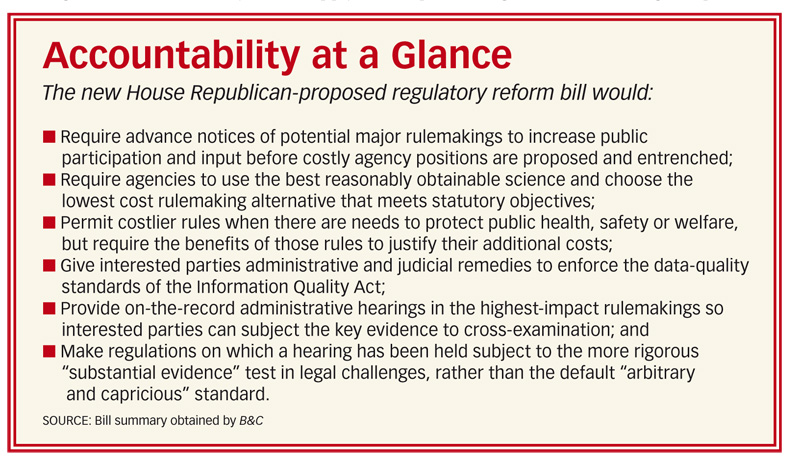New Bill Could Set Limits On FCC Rulemaking

The smarter way to stay on top of broadcasting and cable industry. Sign up below
You are now subscribed
Your newsletter sign-up was successful
Accountability—that still popular buzzword around the Beltway—recently found itself heard at the Federal Communications Commission, in the form of the just-introduced Regulatory Accountability Act of 2011. The act, if passed, would put new limits on how agencies such as the FCC create and affect standards in the industry. Had those limits been in effect by now, they may well have produced a different decision out of the Supreme Court on high-profi le indecency cases.
While the bill would have to run the punishing gauntlet of a Democratic Senate, the White House has been pushing agencies to vet their regulations for those that adversely affect jobs or the economy.
One of the mantras of the Republican-controlled House has been what many see as the job-killing, investment-chilling, innovationimpairing and costly “overregulation” by the government.
In that spirit, the bill, motormanned by Rep. Lamar Smith (R-Tex.), would modify the Administrative Procedures Act (APA), which is a de facto technical manual for the process of regulation, to make it harder for agencies looking to keep a heavy hand on industry to “manipulate” rules.
Tightening the reins could affect the FCC more than other agencies. Unlike the Environmental Protection Agency or Food and Drug Administration, whenever the FCC vets mergers, it has some extra discretion provided by the “public interest” standard to range into non-empirical areas such as unserved communities (broadband), diversity (ownership) or speech (indecency).
The Act’s list of proposals includes requiring more advanced notice of “major” rulemakings (ones with an economic cost of at least $100 million) and holding administrative hearings on “highest-impact rulemakings” (estimated cost to economy of at least $1 billion), along with toughening the standard for studying regulatory rules from its present “arbitrary and capricious” norm to a “substantial evidence” standard.
If this were the case, for example, the Supreme Court might have had a tougher time reversing the lower court smackdowns of FCC indecency decisions. In those cases, the Supremes said the FCC had met the less stringent “arbitrary and capricious” standard in the APA rules.
The bill would also prevent what Republicans saw as a lack of notice on the final version of the FCC’s network-neutrality rules. Republican Commissioner Robert McDowell opined at the time that he and his staff did not get to see the draft they would be voting on until 11:42 the night before the meeting. That point was picked up by Republican legislators who took aim at the rules.
Randolph May of the Free State Foundation says the bill would be a net positive.
“While I don’t agree with all aspects of the proposed Regulatory Accountability Act, for long-time FCC regulatory reform advocates like myself, overall, it would have a positive effect,” May tells B&C. “Most significantly, the bill would subject the FCC to rulemaking requirements, such as cost-benefit and cost-effectiveness analyses, that presently do not apply to independent agencies. And for high-impact rules for which an on-the-record hearing is required, it would impose a more rigorous standard of review the agency must meet to pass judicial muster. Much of what is in the proposed bill has been embraced by President Obama this year, at least in theory, as he, belatedly, has begun talking about the need to reduce unnecessary regulation. He should get behind this bill.”
Cable attorney Dan Brenner, a partner at Hogan Lovells, likes what he sees in Congressman Smith’s reform package. “The Bill appears to focus on generally prudent principles that say, ‘Show your work; check it twice.’”
E-mail comments to jeggerton@nbmedia.com and follow him on Twitter: @eggerton
The smarter way to stay on top of broadcasting and cable industry. Sign up below
Contributing editor John Eggerton has been an editor and/or writer on media regulation, legislation and policy for over four decades, including covering the FCC, FTC, Congress, the major media trade associations, and the federal courts. In addition to Multichannel News and Broadcasting + Cable, his work has appeared in Radio World, TV Technology, TV Fax, This Week in Consumer Electronics, Variety and the Encyclopedia Britannica.

